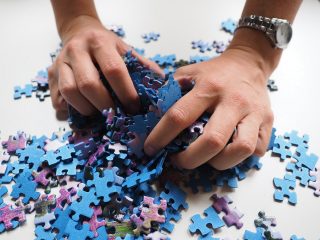Generally speaking, mental health refers to the cognitive, behavioral, and emotional well-being of a person. It affects how people think, act, and feel which basically constitutes their daily living, relationships, and physical health.
Unfortunately, health conditions such as stress, depression, or anxiety can affect mental health and disrupt a person’s routine. According to statistics from late June 2020, about 40% of U.S. adults have reported struggling with a mental health disorder. Consequently, discussions about mental health are becoming increasingly common and many are reaching out for help. There’s even been a World Mental Health Day established since 2019 to educate and increase awareness of mental illnesses and to help people cope with these problems.
Besides following up on such discussions, there are other ways to make mental health problems more manageable. They’re considered a hobby and a fun way to pass the time. That said, jigsaw puzzles prove beneficial in dealing with mental problems as well.
In this post, we are going to elaborate on how to use jigsaw puzzles for adults suffering from mental health conditions as well as how they help with child development.
Benefits of Jigsaw Puzzles for Brain and Mental Health
Dementia
Dementia is the umbrella term used to refer to memory loss and decline of other thinking abilities. According to statistics, adults over the age of 65 are considered the most vulnerable age group to this illness. Health conditions that fall into the category of dementia are usually caused by abnormal changes in the brain that can affect people’s overall behavior, feelings, and relationships.

Lightspring/Shutterstock
Many of these conditions can be progressive. This means that signs of dementia can start out slowly and gradually get worse. Since one of the most common symptoms of dementia is memory loss, jigsaw puzzles can provide exercise to improve brain functions including short-term memory. They relieve these symptoms and provide comfort and a sense of control to patients suffering from dementia. Also, doing custom photos or personalized puzzles can help evoke memories in the process. Completing a jigsaw puzzle can give such patients the so-called “feel-good” effect, producing dopamine in the brain which will provide them with a feeling of accomplishment.
Alzheimer’s disease
The most common cause of dementia is Alzheimer’s disease, accounting for about 60% to 80% of cases. It is a progressive disorder which leads to the degeneration of brain cells. Like dementia, one early sign of the disease is forgetfulness. As it progresses, a person suffering from Alzheimer’s disease will develop serious memory loss. They can also lose the ability to do everyday tasks.
In addition to these symptoms, patients with Alzheimer’s disease usually have difficulties concentrating and thinking. In order to manage these symptoms, it is advised that patients engage in solving jigsaw puzzles.
Patients will use their mind to study images and sharpen the brain’s focus skills. Although paying attention to great detail may be difficult, the result will be increased concentration. Not only will this improve their attention span, but it will also eliminate any distractions that may decrease focus.
Also, patients with Alzheimer’s disease face challenges in solving problems which usually require taking innovative approaches. Finding the perfect puzzle piece involves plenty of creativity that can help manage this symptom.
Anxiety
Anxiety disorders are considered the most common form of emotional distress. They occur when a person’s body is naturally responding to stress, worry, and fear. These responses affect people’s ability to function in everyday life.
The most common type of mental condition is generalized anxiety disorder (GAD). It is characterized by feeling restless, fatigued, and less focused. Because these symptoms can cause a lot of discomfort, jigsaw puzzles can help ease tense feelings, racing minds, and constant worries in patients suffering from anxiety.
In fact, jigsaw puzzles can be very relaxing and calming. When a person is solving a jigsaw, they focus their mind on finding the right pieces. This will help provide the patient with a breather from stress. It will also take their mind off of things that may be causing them to feel anxious or strained.
Also, the texture and the ability to sort and organize the puzzles can give some patients a sense of control, thus providing a calming effect.
Encouraging child development
Child development refers to the changes in a child’s physical, social, emotional, cognitive, and language skills. All these areas are related to each other and work together for successful growth in children.
The first three years of every child’s life are critical for development. During this time, children’s main way of learning and evolving is through play. This gives them opportunities to explore, observe, experiment, and solve problems. Plays are usually games that include talking, singing, reading, and moving that actively engage your child’s brain.

Image by Hans Braxmeier from Pixabay
A game that certainly helps encourage brain development in children is jigsaw puzzles. By solving puzzles, the attention span of a child will last much longer. This is because they will be focused on finding the right piece to the puzzle by differentiating shapes and colors.
Puzzles can also improve a child’s motor skills. Young children are clumsy and need more practice to be able to hold and move small objects. That said, puzzles allow children to make accurate movements in order to fit the pieces together.
Final thoughts
Jigsaw puzzles prove to be very beneficial for the mind, body, and spirit. Whether you suffer from a brain condition or not, these puzzles are an excellent way to entertain the mind. They can also promote mental health and clarity. Don’t wait any longer and give jigsaw puzzles a try in order to piece together a better life perspective.




![women [longevity live]](https://longevitylive.com/wp-content/uploads/2020/01/photo-of-women-walking-down-the-street-1116984-100x100.jpg)










